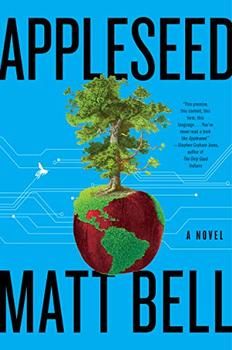
In the vein of Neal Stephenson and Jeff VanderMeer, an epic speculative novel from Young Lions Fiction Award–finalist Matt Bell, a breakout book that explores climate change, manifest destiny, humanity's unchecked exploitation of natural resources, and the small but powerful magic contained within every single apple.
In eighteenth-century Ohio, two brothers travel into the wooded frontier, planting apple orchards from which they plan to profit in the years to come. As they remake the wilderness in their own image, planning for a future of settlement and civilization, the long-held bonds and secrets between the two will be tested, fractured and broken—and possibly healed.
Fifty years from now, in the second half of the twenty-first century, climate change has ravaged the Earth. Having invested early in genetic engineering and food science, one company now owns all the world's resources. But a growing resistance is working to redistribute both land and power—and in a pivotal moment for the future of humanity, one of the company's original founders will return to headquarters, intending to destroy what he helped build.
A thousand years in the future, North America is covered by a massive sheet of ice. One lonely sentient being inhabits a tech station on top of the glacier—and in a daring and seemingly impossible quest, sets out to follow a homing beacon across the continent in the hopes of discovering the last remnant of civilization.
Hugely ambitious in scope and theme, Appleseed is the breakout novel from a writer "as self-assured as he is audacious" (NPR) who "may well have invented the pulse-pounding novel of ideas" (Jess Walter). Part speculative epic, part tech thriller, part reinvented fairy tale, Appleseed is an unforgettable meditation on climate change; corporate, civic, and familial responsibility; manifest destiny; and the myths and legends that sustain us all.
"Bell delivers a stirring take on climate change, complicity, and human connection...This is an excellent addition to the climate apocalypse subgenre, and the way it grapples with humanity's dramatic influence on the planet feels fresh and bracing." - Publishers Weekly
"[E]pic...A flawed but admirably big-thinking attempt to make readers rethink climate and climate fiction" - Kirkus Reviews
"The reason you've never read a book like Appleseed is that there's never been a book like Appleseed. The scary thing, though, is this is a world you might recognize. This premise, this content, this form, this language—only Matt Bell could have given us this novel." - Stephen Graham Jones, author of The Only Good Indians
"This is a fiercely original book—at once intimate and epic, visceral and philosophical—that sent me scurrying for adjectives, for precedents, for cover. Matt Bell commands the page with bold, vigorous prose and may well have invented the pulse-pounding novel of ideas." - Jess Walter
"Appleseed is a work of incandescent imagination, at once an eco-horror story about human greed and a regenerative new myth. I loved the soaring possibilities seeded throughout this wild novel, which pushes its readers to imagine 'new ways of dwelling' in and with non-human nature. Bell's book is a chrysalis inside of which I could feel my mind changing, preparing for new flights." - Karen Russell
This information about Appleseed was first featured
in "The BookBrowse Review" - BookBrowse's membership magazine, and in our weekly "Publishing This Week" newsletter. Publication information is for the USA, and (unless stated otherwise) represents the first print edition. The reviews are necessarily limited to those that were available to us ahead of publication. If you are the publisher or author and feel that they do not properly reflect the range of media opinion now available, send us a message with the mainstream reviews that you would like to see added.
Any "Author Information" displayed below reflects the author's biography at the time this particular book was published.
Matt Bell is the author of the novels Scrapper and In the House upon the Dirt between the Lake and the Woods, as well as the short story collection A Tree or a Person or a Wall, a non-fiction book about the classic video game Baldur's Gate II, and several other titles. His writing has appeared in The New York Times, Tin House, Conjunctions, Fairy Tale Review, American Short Fiction, and many other publications. A native of Michigan, he teaches creative writing at Arizona State University.
Your guide toexceptional books
BookBrowse seeks out and recommends the best in contemporary fiction and nonfiction—books that not only engage and entertain but also deepen our understanding of ourselves and the world around us.